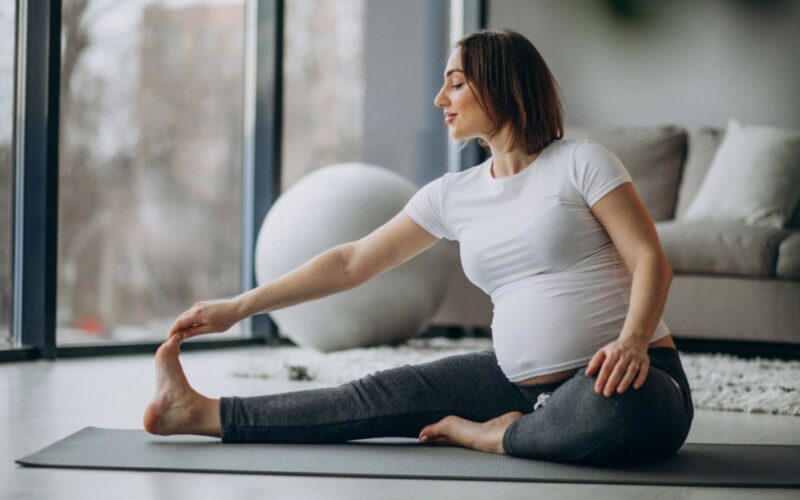Table of Contents Show
Selecting the best yoga mat for pregnancy is crucial for ensuring comfort and safety during prenatal yoga sessions. This guide provides recommendations and factors to consider when choosing a yoga mat for pregnancy, including thickness, material, texture, and size. Find the perfect mat for your pregnancy journey.
Finding the best yoga mat for pregnancy can be a bit overwhelming, considering the plethora of options available in the market. It is crucial to select a mat that not only provides comfort but also ensures safety during your prenatal yoga sessions. This comprehensive guide will help you make an informed decision and select the best yoga mat for your pregnancy journey.
Disclosure: As an Amazon Associate I earn from qualifying purchases.
Why is Yoga Important During Pregnancy?
Physical Benefits
- Improves Flexibility: During pregnancy, the body produces a hormone called relaxin, which loosens the ligaments and joints to prepare the body for childbirth. Yoga exercises involve gentle stretching of the muscles, which helps in improving flexibility and can make it easier to adapt to the changes happening in the body.
- Strengthens Muscles: Prenatal yoga involves poses that target specific muscle groups, which are essential for supporting the added weight during pregnancy and for preparing the body for labor and delivery.
- Promotes Better Breathing: Breathing exercises, or pranayama, are a fundamental part of yoga practice. These exercises can help in improving lung capacity and promoting better oxygen circulation to both the mother and the baby.
Mental Benefits
- Reduces Stress and Anxiety: Pregnancy can be a stressful time for many women, and high levels of stress can have adverse effects on both the mother and the baby. Yoga exercises involve deep breathing and mindfulness, which can help in reducing stress and anxiety levels.
- Improves Sleep: Regular practice of yoga can help in improving sleep quality by promoting relaxation and reducing anxiety.
- Prepares the Mind for Childbirth: The practice of mindfulness and deep breathing during yoga can help in preparing the mind for the challenges of labor and childbirth. It can also help in developing a positive mindset and building mental strength.
What to Consider When Choosing the Best Yoga Mat for Pregnancy
1. Thickness and Support
During pregnancy, the body undergoes significant changes, and there is an increased pressure on the joints and spine. Therefore, it is crucial to select a yoga mat that provides adequate cushioning and support.
- Optimal Thickness: A mat that is too thin may not provide enough cushioning, while a mat that is too thick may affect balance and stability. The recommended thickness for a yoga mat during pregnancy is at least 6mm.
- Support for the Joints: It is essential to choose a mat that provides good support for the joints, especially the knees, wrists, and ankles.
2. Material
The material of the mat is another critical factor to consider as it affects the durability, cushioning, and grip of the mat.
- Eco-Friendly and Non-Toxic: It is recommended to choose a mat made of eco-friendly and non-toxic materials, as some materials may release toxic chemicals over time[^3]. TPE (Thermoplastic Elastomers) and natural rubber are good eco-friendly options.
- Durability: The mat should be durable and able to withstand regular use without wearing out quickly.
- Cushioning: The material should provide adequate cushioning to support the joints and spine during exercises.
3. Texture and Grip
The texture of the mat is incredibly important as it affects both the grip and comfort of the mat. A mat with a slightly textured surface will provide a better grip and prevent slipping during exercises, which is particularly important during pregnancy when maintaining balance and stability is crucial.
There are different types of textures available, from raised bumps to subtle patterns or a completely smooth surface. Mats with a too rough texture may cause discomfort, while mats that are too smooth may not provide enough grip, leading to slips during exercises. Therefore, it’s essential to choose a mat with a texture that feels comfortable on your skin and provides adequate grip.
4. Size
The size of the mat is another crucial factor to consider, especially during pregnancy when you might need a bit more space. A standard yoga mat is typically around 68-72 inches long and 24-26 inches wide, but you may need a larger mat during pregnancy to accommodate your changing body and to provide ample space for movement.
Make sure to choose a mat that is long and wide enough for your entire body to fit comfortably, allowing space for a full range of motion during exercises. Additionally, consider the size of the yoga space you have available to ensure the mat will fit comfortably in the area you plan to practice.
It’s also worth considering the weight of the mat, especially if you plan on taking it to a yoga class or moving it around frequently. Some mats can be quite heavy, which may not be ideal during pregnancy.
Recommended Yoga Mats for Pregnancy
1. Yoga Mama Prenatal Yoga Mat
Features:
- Material: TPE (Thermoplastic Elastomer)
- Thickness: 8mm
- Size: 72 x 26 inches
- Texture: Softly textured for grip
- Special Attributes: Pregnancy-safe, hypoallergenic
Why it’s Recommended: The Yoga Mama prenatal yoga mat is specifically designed for expecting mothers. It is free from harmful chemicals and materials, making it safe for both the mother and the baby. The 8mm thickness ensures excellent cushioning and comfort, especially for the sensitive joints and back that you may experience during pregnancy.
User Reviews:
Most users highlight the excellent cushioning and support this mat provides, stating that it made their yoga sessions comfortable and more enjoyable.
2. Manduka Pro Yoga Mat
Features:
- Material: PVC (OEKO-TEX certified)
- Thickness: 6mm
- Size: 71 x 26 inches
- Texture: Closed-cell surface to keep moisture and bacteria at bay
- Special Attributes: Durable, lifetime guarantee
Why it’s Recommended: While not designed specifically for pregnant women, the Manduka Pro Yoga Mat has the durability and cushioning that many expecting mothers seek. The mat is OEKO-TEX certified, meaning it’s tested and confirmed to be free of harmful substances.
User Reviews:
Many users praise the Manduka Pro Yoga Mat for its durability, stating that the mat has lasted them for several years. However, some users mention that it might be a bit heavier to carry.
3. prAna Verde Yoga Mat
Features:
- Material: TPE
- Thickness: 6mm
- Size: 72 x 24 inches
- Texture: Dual-sided texture for excellent grip
- Special Attributes: Eco-friendly, UV-resistant
Why it’s Recommended: The prAna Verde Yoga Mat offers excellent cushioning with its 6mm thickness. Made from eco-friendly TPE material, it’s free from harmful chemicals and substances, providing a safe environment for your prenatal yoga.
User Reviews:
Customers love the dual-sided texture, noting that it provides excellent grip on both wooden and carpeted floors. The UV-resistant feature also makes it a good choice for outdoor yoga sessions.
4. Gaiam Performance Jute Yoga Mat
Features:
- Material: Mix of jute fiber and PVC
- Thickness: 6mm
- Size: 68 x 24 inches
- Texture: Natural fiber texture for grip
- Special Attributes: Renewable, biodegradable material
Why it’s Recommended: Gaiam’s Performance Jute Yoga Mat is a great choice for those who prioritize both sustainability and comfort. The mix of jute fiber and PVC provides a unique balance between durability and eco-friendliness.
User Reviews:
Customers appreciate the environmental aspect of the jute material. However, some have mentioned that it may not be as cushioned as pure PVC or TPE mats.
You May Also Like: Master the Online Prenatal Yoga Certification in 5 Potent Steps
Conclusion
Selecting the best yoga mat for pregnancy involves considering factors like thickness, material, texture, and size. It is essential to choose a mat that provides adequate support and cushioning for the joints and spine, is made of eco-friendly and non-toxic materials, and has a textured surface for better grip. The Yoga Mama prenatal yoga mat, Manduka Pro Yoga Mat, prAna Verde Yoga Mat, and Gaiam Performance Jute Yoga Mat are all excellent options for expecting mothers.
FAQs
Q1. Is it safe to do yoga during pregnancy?
Yes, it is safe to do yoga during pregnancy, and it is actually recommended as it helps in preparing the body and mind for childbirth. However, it is essential to consult your healthcare provider before starting any exercise regimen during pregnancy.
Q2. What are the benefits of yoga during pregnancy?
Yoga during pregnancy has several benefits, including improved flexibility, strengthened muscles, better breathing, reduced stress and anxiety, and better preparation for childbirth.
Q3. What is the recommended thickness for a yoga mat during pregnancy?
The recommended thickness for a yoga mat during pregnancy is at least 6mm. This thickness provides adequate cushioning and support for the joints and spine.
Q4. Are PVC yoga mats safe for pregnancy?
While PVC mats are durable and offer good support, they may not be the most eco-friendly choice and could potentially release toxic chemicals over time. Always look for PVC mats that are OEKO-TEX certified as free from harmful substances if you choose this material.
Q5. Can I use a regular yoga mat during pregnancy?
While it is possible to use a regular yoga mat during pregnancy, it is recommended to choose a mat that provides extra support and cushioning for the joints and spine. A thicker mat made of eco-friendly and non-toxic materials is ideal for pregnancy.
You May Also Like: 7 Yoga Poses to Avoid When Pregnant (and Safe Alternatives!)



